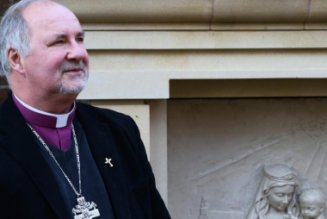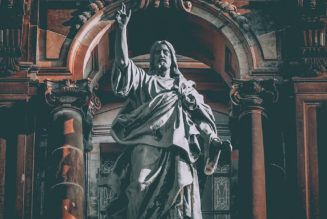A lively thinker and great talker — a man who lived to think and to share his thoughts — couldn’t any more. Dorothy Day’s mentor and friend Peter Maurin had been one of those men of innocence and energy, who walk into the room and start talking, throwing off ideas like fireworks.
Now his mind was going. He was a month short of 70. In the middle of Lent, he’d wandered off, and no one could find him. Maurin was suffering an unasked-for Lent. It’s one almost all of us will go through, if we live long enough.

Peter Maurin in front of one of the first Catholic Worker houses. Public domain, via Wikimedia Commons
Maurin must have been at times an exhausting companion. Innocence combined with genius often is. But he seems to have been a great man, and possibly a saint, and Day and his friends loved him. “We slept uneasily,” Day writes in her April 1947 column in The Catholic Worker. “We dreamed of hearing his footsteps on the stair, or hearing his cough, of his call. ‘Dorrity,’ he always called me. But there was no sign of him.”
They had reasons to be anxious. “His accent was so thick, and had become thicker these recent years, so if he did ask directions, falteringly, would people take the trouble to wait patiently until they understood him, and answer him? Or would he be too independent to inquire? There are strong streaks of the anarchist in Peter.”
Then she writes the sad words: “Yes, Peter is bearing his cross now, not being able to use the mind in which he used to take such keen delight. ‘I can no longer think,’ he says now and then, sadly.”
She’d been taking care of him and worried he might not like it. “Maybe he rebelled against this softness and had decided he would go back on the Bowery to end his days in solitude and poverty, in the midst of those in whom we try to see Christ in his most degraded guise.” It would have been characteristic. And with dangers he knew. “It was cold too, those days he was gone, and Rocco spoke mournfully of the wolves on the Bowery who wouldn’t hesitate to knock an old man down and steal his coat.”
Four days after he disappeared, he came back. He looked better. Thinking he was in a different city, he thought he’d get home if he took the right bus. He’d spent the days riding buses from the southern tip of Manhattan all the way up Manhattan and into the Bronx and back again. He must have passed, a few blocks to the west, the Catholic Worker house on the Lower East Side where he lived many times. As Day suspected, he’d been too independent to ask for directions.
Several times the police had told him to move along, thinking him homeless. He suffered one effect of the voluntary simplicity and poverty in which he lived. “If he had not had an accent; if his clothes had not been so crushed and dusty; if his shirt had not been so dirty from his travels — in other words, if he had not been a shabby old foreigner, to whose queries no one would be patient and listen to, he would not have wandered as he did for four days and nights.”
His friends at the Catholic Worker house put notes in his pockets, as if he were a child, reading “I am Peter Maurin, founder of the Catholic Worker movement. I live at 115 Mott Street, half a block north of Canal.” Day asked her readers to bring him home if they saw him wandering the city. They planned to send him after Easter to the Catholic Worker farm in Newburgh, north of New York City. There “he can sit on the porch in the sun and watch John spreading manure over the fields ready for plowing.”
Day wrote that in April 1947. Maurin’s unchosen Lent lasted two more years. He died on May 15, 1949.
I never thought, until recently, that growing older would bring its own kind of Lenten experience. (And, of course, some people live unchosen Lents their entire lives.) Pleasures will be taken away, rather than given up. Abstinences will be assigned, rather than chosen. You may lose what you most valued, as Maurin lost the use of his mind. The truth that “you are dust and to dust you will return” will feel truer than it had on the Ash Wednesdays of youth and middle age. I’ve always enjoyed playing Lent as a kind of game, but, eventually, it will be a job more than a game.
But the rules stay the same. You do it for Jesus, as best you can, and trust in his mercy and love. The end stays the same. At the end, you meet the risen Lord.
David Mills writes from Pennsylvania.
Join Our Telegram Group : Salvation & Prosperity











